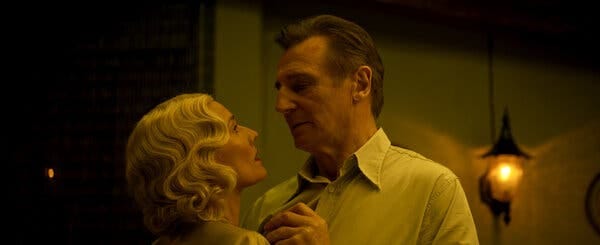Marlowe
A gorgeous-looking if often confusing potboiler that revives the iconic Raymond Chandler detective with Liam Neeson lending a creased charm to the role.
“Marlowe” is a deliberate throwback type of filmmaking, a recreation-slash-homage to the film noir potboiler detective stories of Golden Age Hollywood. It’s a gorgeous-looking movie, though it follows in the tradition of its cinematic ancestors (“The Maltese Falcon,” “The Big Sleep”) in having a plot that is more experienced than understood.
Raymond Chandler isn’t writing any more books about Philip Marlowe, the crusty iconic Los Angeles private detective, but John Banville did pen a new Marlowe novel, “The Black-Eyed Blonde,” a few years ago that director Neil Jordan (“The Crying Game”) and screenwriter William Monahan (“The Departed”), both Oscar winners, have turned into this feature film.
Liam Neeson takes on the role of Marlowe circa 1939. In this iteration he’s an ex-war hero who worked as an investigator for the district attorney, but drink cost him his job and pension, and now he’s eking out an existence as a gumshoe for hire. He wallows through a lot of human filth but keeps to his own code of ethics, such as unerring loyalty to whatever client is currently paying his bills.
Neeson is 70, though I’m guessing his Marlowe is probably in his late 50s or so, worn down but still unable to let go of a good mystery. He has friends on the police force — Colm Meany turns up his contemporary, Bernie Ohls, who alternately hounds or assists him — but is very much a loner when it comes to snooping.
His new client is Clare Cavendish (Diane Kruger), an icy blonde femme fatale type who wants Marlowe to find the whereabouts of her lover, a young studio prop master and hustler named Niko Peterson (François Arnaud). Her infidelity is known openly to her husband (Patrick Muldoon), who settles for being around the family money.
Clare’s mother is Dorothy (Jessica Lange), a former silent screen star, and the two have an odd competitive relationship — up to and including sharing Niko’s bed, it seems. There’s also a mysterious older man known as The Ambassador owing to his pending appointment by the President; he runs a lower-end studio, Pacific Films, and acts as “financial advisor” to both Cavendish women.
Marlowe quickly learns that Peterson is dead — or, at least, somebody with his clothes and identification was run over by a car in front of the Corbata Club, an exclusive denizen for Hollywood types who want to be naughty away from the spotlight. Danny Huston, who must hold some kind of record for never playing a non-villainous character, is Floyd Henson, who runs the place and has his fingers in various pies. He always wears a white tux, just because.
Later on we meet Lou Hendricks (Alan Cumming), a slithery crime boss who cruises around in a Bentley limo, and his chauffer/enforcer Cedric (Adewale Akinnuoye-Agbaje), who factor in. And Niko’s sister (Daniela Melchior), who mourns him but doesn’t know he might still be alive. And there are a couple of Mexican toughs in a stolen car, along with various henchmen and hangers-on to confound or rough up Marlowe in his quest.
It’s a lot of names and faces, and you’ll be pardoned for losing track of it all. Hendricks ups the ante late in the game by revealing his desperate need to find someone named Serena, which left me baffled.
At some point you have to just embrace the confusing nature of the story and luxuriate in the old-timey atmosphere of the film. The production design is magnificent with period settings, costumes and vehicles. I liked that Marlowe drives around in an appropriately un-spectacular 1935 Plymouth coupe. Neeson looks great in era suits and hats, and he’s constantly pulling out, puffing on or heel-stepping on a cigarette.
There’s also a lot of memorable Chandler-esque dialogue, such as Hendricks boasting that he’s composed “entirely of grease and tarantulas.” Or the Cavendishes talking about “the black dog” of depression that runs through the family.
You might think Jordan would’ve chosen to shoot the film in black-and-white with hazy shadows, but instead he leans the other way with super-saturated colors and sharp focus. The crispness of the imagery stands as interesting counterpoint to the (I think) deliberately confusing story.
Marlowe finds himself receiving pitched woo from both mother and daughter Cavendish. He’s a bit bedazzled by Dorothy’s faded celebrity but finds himself genuinely drawn to Clare. Though he puts her off, saying he’s old enough to be her father. Plus, falling for a client, especially a beautiful one, would “make me lose my bearings.”
You’ll either surrender to the charms of “Marlowe” or wind up scratching your head at its jittery plot perambulations. Neeson brings a creased, weary charm to the role, playing a man who’s had a run of bad luck so long you have to respect him for still striving to stay on the right side of the line.
In a city so corrupt, in a story that can sometimes seem rudderless, Marlowe’s true north gives us something to hold onto.





